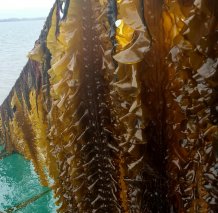
An innovative seaweed farm is set to spring up this summer in Cornwall, thanks to a new collaboration featuring researchers from Exeter.
Innovative seaweed farm introduced to Cornwall
An innovative seaweed farm is set to spring up this summer in Cornwall, thanks to a new collaboration between Cornish Seaweed Company, Westcountry Mussels, researchers from the University of Exeter and Plymouth Marine Laboratory.
Seaweed is a healthy, sustainable source of carbon-negative food with a large global market and this year the Cornish Seaweed Company became the first in the UK to successfully cultivate seaweed commercially at sea, at their seaweed farm on the Lizard Peninsula in Cornwall.
This project will investigate methods of growing sugar kelp at large scale and measure the benefits to the environment that seaweed farms could provide. By integrating with existing shellfish aquaculture, the project will support the region’s producers in leading the way to provide food that is healthy, tasty and good for the environment.
The algae cultivation industry is set for expansion in the UK, as the health and nutritional benefits of seaweed consumption become clear. Providing a sustainable source of protein, omega-3, iron, a range of vitamins and minerals and other key nutrients, seaweed is expected to play an important role in new diets, including the increased prominence of plant-based diets in reaction to new data on food-related carbon emissions.
Tim van Berkel, Managing Director of the Cornish Seaweed Company, said; “Our success is a huge step towards creating a truly sustainable food and resource economy, and we are proud to be on the forefront of this important development.
"Five years ago hardly anyone had thought of seaweed as a commercial product. Now we are realising the enormous potential it has. From food and livestock feed to biofuels, bioplastics, pharmaceuticals, medicines and even clothing, there is hardly anything that seaweed cannot be used for.”
Seaweed cultivation is purported to have a wide array of environmental benefits, including mitigating harmful algal blooms (HABs) and providing habitats for marine species, as well as combating climate change.
In addition, seaweeds do not need fresh water, pesticides, fertiliser or land to grow on, and they have very fast growth rates, making them sustainability champions. Scientists at the University of Exeter and Plymouth Marine Laboratory will be assessing these benefits, to gain an understanding of how new seaweed aquaculture developments would interact with their environment.
Dr Ian Ashton of the Centre for Offshore Technology in Cornwall said; “It is great to work with an up and coming local businesses, helping overcome the challenges to develop a product that is both commercially and environmentally sustainable.”
The project, funded by the European Maritime and Fisheries Fund, will lay the foundation for interdisciplinary research projects in the Southwest in the future, as well as accelerating the growth of the seaweed cultivation industry in the region.
The research project is set to start in summer 2019 in Porthallow, Cornwall and will run for 18 months.
Date: 29 April 2019
